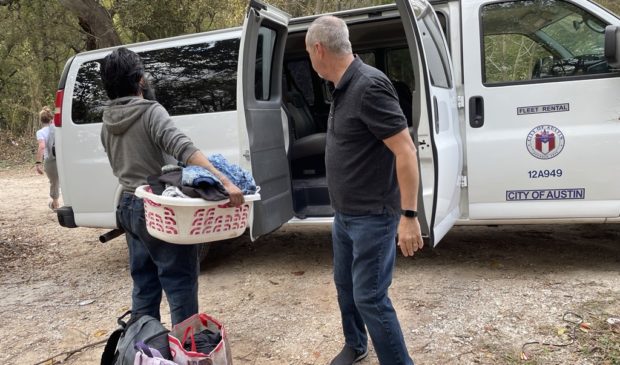Photo by city of Austin. Photo from a HEAL initiative effort.
Tight rental market increasing wait times for city efforts to house the homeless
Monday, April 18, 2022 by
Chad Swiatecki The city’s tight rental market is causing some delays in efforts to find housing for people who have recently been removed from homeless encampments as part of a program launched last year targeting those gathering areas around the city.
At last week’s meeting of City Council’s Public Health Committee, Homeless Strategy Officer Dianna Grey revealed that the typical enrollment time for those in the Housing-Focused Encampment Assistance Link (HEAL) initiative was growing beyond 90 days because of the difficulty finding available units at reasonable rental rates. With area rents leaping by 35 percent in the 12 months preceding January 2022, Grey said property managers have their pick of tenants and are less inclined to accept applicants with poor credit and other obstacles faced by the recently homeless.
“It’s been quite a challenge because our tenants come with nontraditional profiles in terms of job history, their credit, and obviously their incomes are very low. The recent changes in the rental market have had a very important impact on how long it’s taking us to find units,” Grey said. “We are moving some funds to help with additional landlord incentives for double deposits and those kinds of things, but it is a huge challenge that we’re encountering now.”
Grey also shared that in recent months the city has cleared out encampments in West Bouldin Creek and near St. Johns Neighborhood Park. The HEAL program then attempts to move people into bridge shelters and eventually permanent housing options such as apartments or permanent supportive housing units subsidized wholly or in part by the city.
During that time, Grey said, more than 65 people were moved into bridge shelters and another 26 were moved into permanent housing.
Through the end of March, the HEAL program has served 99 individuals, putting it ahead of pace toward the goal to help 200 people, with 247 people assisted since its launch last year.
Grey said the city is expected to receive $38 million in American Rescue Plan funds in the coming months that will be used for rapid rehousing and the HEAL program, with contracts expected to be finalized with local homelessness service providers by July.
Council Member Kathie Tovo asked Grey to work with Parks and Recreation and the Austin Fire Department to improve coordination around the cleanup of HEAL-targeted encampments. She pointed to a fire that took place near the Bouldin Creek encampment because the area wasn’t promptly cleaned up after its residents were removed.
After questions from Mayor Steve Adler about the problem of other encampments being quickly repopulated after city crews disperse them, Grey said the HEAL program is only able to help a limited number of encampments at a time. That means other areas cleared out don’t have coordination and resources readily available to help find shelter and housing for those who had been living in the encampments.
“HEAL is only involved in a small minority of those, so most of the encampments that have been cleared have been cleared without direct access to housing and shelter,” she said. “It’s a conversation we’re having with our public space partners, kind of looking at the resources and the staff available to do the work and how we balance going into new encampments to intervene.”
Speaking of the price pressures related to the rental market, Adler said Grey and other city staff need to continue to do as much as they can to produce results so the city can achieve its three-year goal of making a major improvement in reducing homelessness.
“What you’re trying to do is hard, especially in a market with rapidly rising housing prices and limited supply. But that’s why homelessness is a challenge for us that if we don’t fix now, it is going to overwhelm us in six to eight years.”
The Austin Monitor’s work is made possible by donations from the community. Though our reporting covers donors from time to time, we are careful to keep business and editorial efforts separate while maintaining transparency. A complete list of donors is available here, and our code of ethics is explained here.
You're a community leader
And we’re honored you look to us for serious, in-depth news. You know a strong community needs local and dedicated watchdog reporting. We’re here for you and that won’t change. Now will you take the powerful next step and support our nonprofit news organization?










